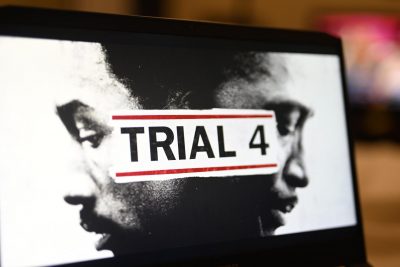Netflix’s newest docuseries, “Trial 4,” released Wednesday, delves into the four trials of Dorchester’s Sean Ellis for the murder of Boston police Detective John Mulligan as well as apparent foul play by the district attorney’s office, the Boston Police Department and the individual officers involved in the case, all of them being Cold Cases.

In the early morning hours of Sept. 26, 1993, Mulligan was shot five times in the head while on security detail outside of a Walgreens pharmacy in Roslindale, Mass. Mulligan had one of the highest arrest records of any officer in the BPD, meaning there would have been a number of possible suspects.
Police placed then-19-year-old Sean Ellis at the scene of the crime on the night in question — he was at that pharmacy buying diapers for his cousin’s child. Ellis was accompanied by his cousin, Celine Kirk, and his friend, Terry Patterson. What followed was a nightmare that lasted 22 years of Ellis’s life.
Ellis and Patterson became prime suspects for the BPD, who worked tirelessly to convict the two men of the murder of their fellow officer.
Ellis endured two mistrials for the case before he was convicted of first-degree murder in September 1995. At the time of the documentary, Ellis was released on bail, awaiting his fourth trial for the murder.
Netflix’s eight-episode docuseries, directed by Remy Burkel, explores the many holes in the prosecution’s story and the possibilities of foul play by the detectives involved in the case.
There are accusations from Ellis’ defense attorneys, jurors and other major players involved in the case that evidence was manufactured by the police, that detectives and prosecutors coerced witnesses into making false accusations against Ellis and that there were systemic problems within the BPD, especially around the time of Mulligan’s murder.
The producers of the series incorporate interviews with former Boston police Detective William Dwyer and Capt. Edward McNelley to defend the BPD’s actions in the years surrounding the case. Both officers refute any suggestion of foul play or aggressive policing methods on the BPD’s behalf, and claim systemic racism never played a role in any officer’s policing methods.
Boston Globe reporters Toni Locy and John Ellement, who covered the story of Ellis’s case and trial, thwarted these claims in the documentary. They provide commentary on how the BPD and district attorney’s office operated during the investigation and trial, arguing that the police have a long history of mishandling crime scenes and struggling to produce irrefutable evidence.
The journalists and defense lawyers remind viewers of the everyday injustices law enforcement seems to get away with. Systemic racism has played a major role in the way detectives and prosecutors seek justice, and the docuseries makes a clear statement that in this case, many corners were cut and legal principles were ignored or manipulated to find a scapegoat for the killing of a police officer.
The series explores every possible avenue of Mulligan’s murder, as well as alternative theories conjured by prosecutors and the defense alike.
Animated recreations of eye witness accounts help viewers visualize the story and contextualize the evidence presented as the investigation processes through the years. These are supplemented with witness claims of definite malfeasances on behalf of the detectives and prosecutors involved, saying they pressured them into testifying under threat of legal punishment.
“Trial 4” comes during a period of unprecedented national hostility against the police, as Black Lives Matter protests have been echoing through the streets of cities and even small towns across the United States. The emotionally gripping details, paired with thorough analysis of the evidence and events, makes this series a jarring reflection of our country’s legal system.
The docuseries attempts to explore why and how police departments as a whole can allow for such misconduct to happen under their watch. It also delves into the legal loopholes and injustices taken to successfully convict an innocent teenager of such a heinous crime he did not commit.
“Trial 4” is an insightful investigative series that keeps viewers fully engaged in Ellis’ story from beginning to end. And for Boston, the case remains significant in highlighting the mistakes of the city’s past and the abuses of power that helped convict an innocent man.

























































































































Valerie Neill • Nov 16, 2020 at 4:44 pm
I’ve watched the series and thought it was very good. We know the investigating cops were corrupt. The victim was corrupt. The investigation wasn’t ever really an investigation, it was a coverup for the corrupt cops. Sean Ellis says he is innocent of the murder and I believe him.
I do have a few questions though, because I don’t think it was ever made clear:
1) Did Patterson actually kill Mulligan and take his gun? Was Ellis just in the wrong place at the wrong time and hitched a ride with the wrong friend? It seems at one point Ellis is admitting that Patterson killed Mulligan and stole the gun and then Patterson gave Ellis the guns to get rid of. Then at another point Ellis says he was just there getting diapers and neither one of them had anything at all to do with the murder. 2) Or, was Mulligan murdered by someone else entirely and the cops planted all the evidence and framed Patterson and Ellis completely? 3) Did the conversation with Ellis and his uncle actually take place or did the cops make the uncle say it did? 3) Did Patterson and/or Ellis every have possession of the guns and hide them or did the corrupt copy bury the guns and frame Ellis and Patterson?